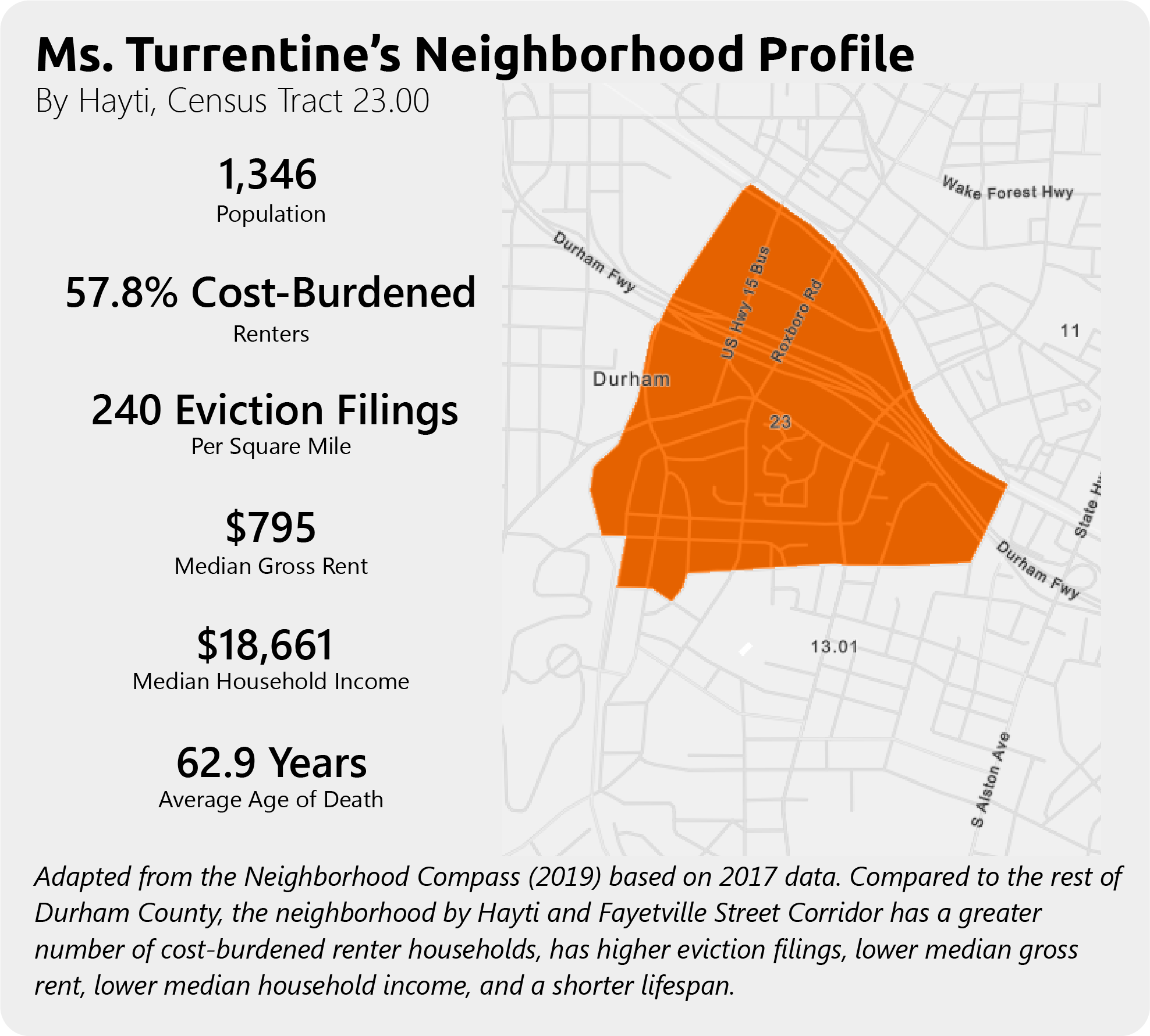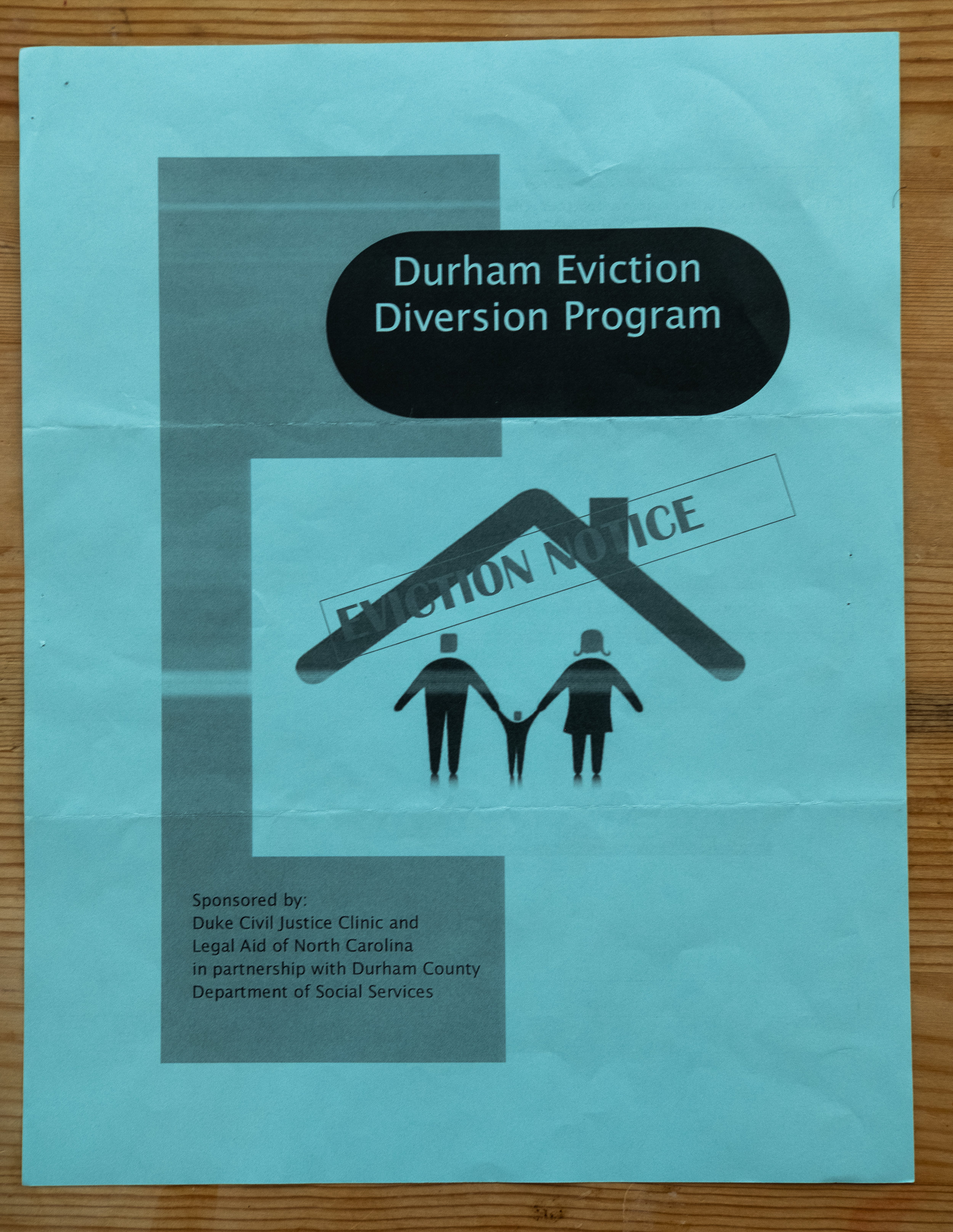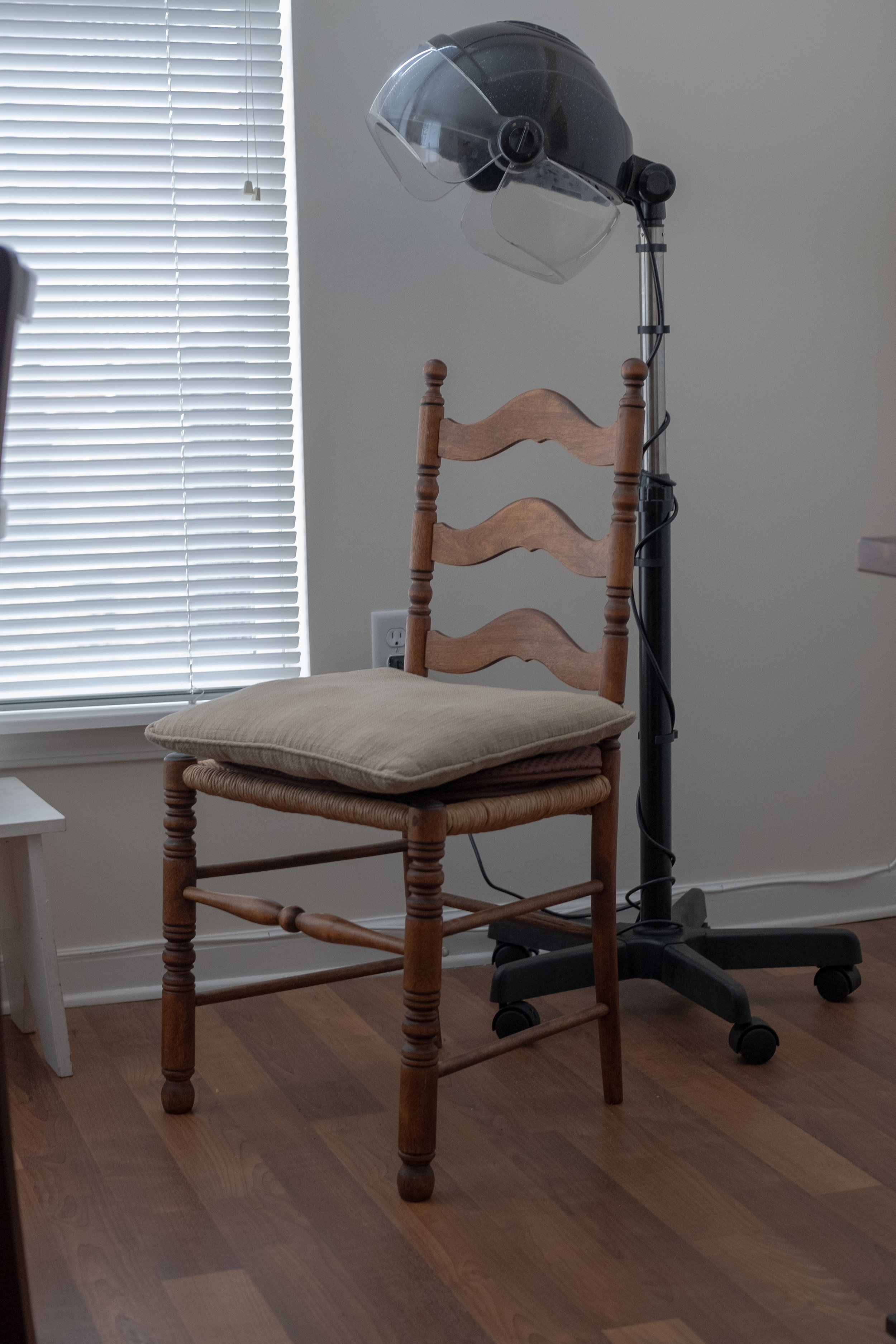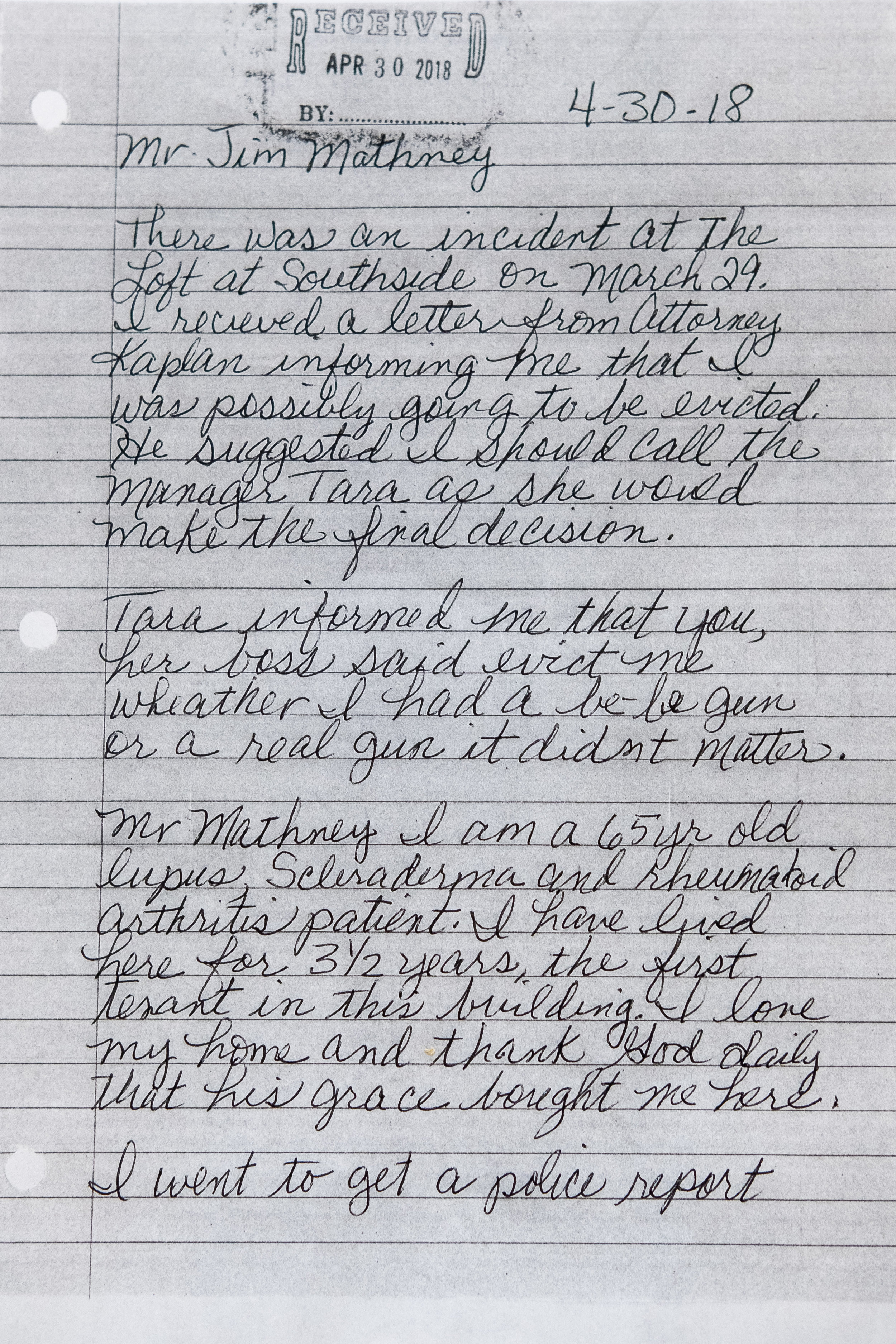The Story of Ms. Turrentine:
A Case of Aggravated Lupus
Despite living with Lupus for more than 10 Years, it was an eviction judgment that caused Ms. Bailey to start experiencing fainting episodes.
One of the things Ms. Turrentine loves the most is doing hair.
Ms. Turrentine, now at 65, is a licensed cosmetologist who was forced into early retirement because of her health, though she has managed to extended her profession in the comforts of her two-bedroom apartment near the Hayti neighborhood in Durham. Next to her impeccable kitchen are staples you see at salons, including a styling chair and a hair dryer stand. When I first met her at the Chicken Hut on Fayetteville Street, she said she stopped doing people’s hair because of lupus, scleroderma, and rheumatoid arthritis, “I hate that I’ve had to stop because I love it.” In 2004, Ms. Turrentine was diagnosed with lupus (an autoimmune disease) and scleroderma (a group of rare diseases that causes thickening of the skin and tightening of connective tissues, affecting her blood vessels and organs), and has learned to live with the conditions since then.
Her passion for hair has shown in the couple of months since meeting her, where she continuously referred to all the friends and acquaintances whose hair she has done in the new year. All simple requests though. She loves the thrill of talking to people and getting to know them in a setting where you take it slow, no matter how much pain she feels in her bones.
Ms. Turrentine’s eviction case is peculiar. An altercation with a young neighbor led to petty retaliations, the threat of a BB gun, the police being called, and no charges for anyone involved. Except that this otherwise non-descript event caused Ms. Turrentine to receive an eviction notice. The eviction process, as Ms. Turrentine describes, was “the most scary thing I have gone through.”
Fearing Death
”I have lost a younger sister and niece to Lupus. […] My nerves are shot because of the disease and shot because I'm losing my weight, and my sister lost weight, um, to 80 pounds. She died at 80 pounds. And I'm, I'm thinking that I'm in that time of losing my weight and I mean, I know what's next.So that was what I felt like when I got that eviction notice. So, however weak, scared, nervous I was experiencing, I got all of that at one time. Everything. I've never been through something that nervous, just embarrassingly nervous, couldn't even sign my name.”
-Ms. Turrentine (2018)
Events Leading up to the Notice
Since 2014, Ms. Turrentine has been the only tenant to reside in her two-bedroom, two-bathroom apartment located in one of the Durham’s Low Income Housing Tax Credit communities. However, she has been living in the space with support of her Section 8 voucher, allowing her to pay $788 a month.
In March 2018, a new neighbor, a young woman in her 20s, moved into one of the apartments by Ms. Turrentine. Ms. Turrentine noticed that the neighbor would walk her dog to Ms. Turrentine’s backyard to let the dog defecate the day after she moved in. A few days later, she saw the neighbor do the same thing with her dog, leaving the poop there. And then it kept happening as Ms. Turrentine watched with annoyance. She formally complained twice to the leasing office.
Repercussions
I was doing great until [this eviction] started happening. I was walking outside by myself, coming up these steps fine […] I lost concentration on me because I was my job. My job was to keep me healthy. And I lost that. I lost it. And I mean I paid for it, because I never, since five years old, been in the hospital except for childbirth.
-Ms. Turrentine (2019)
On March 29, Ms. Turrentine finally confronted the neighbor, a confrontation that turned into a verbal attack. The neighbor challenged Ms. Turrentine to fight. “I’m not talking about fighting, ma’am,” Ms. Turrentine recounted, “I’m just talking about doing the right thing,” but the woman started approaching Ms. Turrentine’s balcony. In a panic, she went to her bedroom and grabbed a BB gun she was gifted by a friend. It was intended for keeping squirrels away from her trash can, but she had never used it before.
Ms. Turrentine approached the neighbor with the BB gun by her side, and once the neighbor noticed the BB gun, she left.
The neighbor reported the incident to the office and called the police, who were informed that Ms. Turrentine had a gun. The police arrived, saw that it was a BB gun—not an offense in North Carolina—and told Ms. Turrentine she would be okay. As she said, “the police officer said I was protecting my domain.” No charges were pressed against anyone.
Eviction Notice
In April, Ms. Turrentine received a summary ejectment letter citing violence not being tolerated in the property. She wrote a letter to the property manager pleading her case. Tehcnically, she did not violate any aspect of the lease and was not charged with any violations.
In a letter dated April 30, she states, that the office manager “informed me that you, her boss, said evict me whether I had a [bb] gun or a real gun, it didn’t matter […] Mr. Mathney, I am a 65-year-old lupus, scleroderma, and rheumatoid arthritis patient […] I love my home and thank God daily that His grace brought me here.” She breaks down the incident in the letter. Mr. Mathney, the property manager, never responded to the letter or her calls.
Along with the eviction note, she also received a flyer for the Durham Eviction Diversion Program. Ms. Turrentine immediately reached out to the program to get representation. Her first court date was set for May 2018.
The Most Scary Thing
"I'm telling you, I cannot remember anything I've gone through like that before. And um, yeah, going, going to court was a monster. I mean, I'm up against losing my home!
And while I was going through that, I was trying to prepare in case I did get evicted. So I started looking for another apartment in case just in case, which I didn't want to be homeless.”
-Ms. Turrentine (2018)
The Court Cases
Ms. Turrentine’s time in court was not easy, at least not for her health. Attorney Peter Gilbert and Ms. Turrentine went to small claims court, continued to district court, and finally won their case over a three-and-a-half-month period. But during this time, Ms. Turrentine had a difficult time describing her daily experiences because of the nerves and fears she felt. Not only was she absolutely “embarrassed” and unlike anything she has ever felt.
While the cases were occurring, she also started experiencing what she calls a “lupus episode.” Prior to the eviction, she never had any serious complications with her conditions. She was on plenty of medication, but nothing major. But she believes the potentially looming eviction initiated a fear of hers that hark memories of her sister, who passed away from lupus after rapidly losing weight: “I was doing great until [the eviction] started happening. I was walking outside by myself and coming up these steps, but I continued to lose weight. […] While that was going on, I passed out in here and thank God that my family was here. They called an ambulance. The whole time I have been diagnosed [with lupus], I, I've never been through anything like that. Yeah. So um, yeah, [doctors] began blood tests, trying to find out why I had passed out.”
Ms. Turrentine felt her chances were up in the air. It’s what she felt in her heart. However, Peter Gilbert believed she had a winning case, and the fact that she had an excellent payment record only helped.
Just to prepare for the worst, she started looking for other apartments that would accept Section 8 voucher. She applied to JFK Towers, an affordable housing community for seniors. On August 29, she received a rejection letter because of her “rental history is unsatisfactory or sufficient” and “criminal and other public record is unsatisfactory.” Ms. Turrentine was shocked. “What in the world was this? I ain't got nothing on my record. I wouldn't be on Section 8 if I had something on my record. I would not have qualified to be in this building.” She also believed the property managers at her current apartment provided an unfavorable referral.
A few days later, on September 4, she wrote a letter to Mr. Gilbert describing the rejection from JFK Towers and wondering what she should do: “how can I clear this up as [an eviction] is the worst thing that could be on my record if I should ever want to move?”
Ms. Turrentine’s case was still being decided; she was still in her apartment. Mr. Gilbert contacted JFK Towers and informed them of the case, warning them not to deny tenants based on ongoing court proceedings and, instead, doing their due diligence to confirm tenants’ final judgments. A conversation with attorney Brent Ducharme revealed that this tends to be an occurrence in the City, where the Clerk’s Office is unable to automatically remove summary ejectment filings from tenant records. Even if they win, it might appear that they were guilty of some type of violation.
Ms. Turrentine was able to finally prove her case and remained in her apartment. All of the magistrates she encountered told her that she did nothing wrong to receive an eviction notice.
See Ms. Turrentine’s Story in Pictures (click thumbnails to magnify images and read the story)
The Aftermath
“I have not been feeling well,” Ms. Turrentine told me at my last visit in late March 2019. Since court, Ms. Turrentine’s health has worsened. She has passed out, flat on her face. She keeps fearing losing weight. She believes she is losing her memory.
She is going to the doctors about once a week, up from the twice-a-month visits she had before the incident. Her doctors gave her a slip that allows her to have a caretaker at her place 24/7 in case something happens. They are unaware of what her housing situation has been like in the past year.
Beyond her health, her relationship with the office manager has not improved either. Ms. Turrentine shared that in January, the office was complaining about her not paying rent on time, but she had a record of submitting the payment within the 5-day grace; it just happened over the holiday break. “I think they want me out and rent this apartment for a higher rent.”
In our last conversation, Ms. Turrentine kept referring to how embarrassing the situation has been for her. I asked her if she has ever met another person who has been evicted. “No, never.” But she did hear about a friend’s neighbor (pregnant with a kid) who was evicted recently because the police was called after her partner was physically violent against her. Ms. Turrentine’s granddaughter said she saw the woman, “grandma, she’s homeless. And she had her kids with her. They should’ve been helping that young lady.”
Ms. Turrentine expressed uncertainty with how her health will fare moving forward. She continued listing all those in her life who have passed away recently. One of her sisters, who advocated for fair housing through Legal Aid, passed away in February 2019 due to diabetic complications. Ms. Turrentine told me matter-of-factly, “I’m getting to that time of life when everyone is dying.”
Story and photographs by Karla Jimenez-Magdaleno (2019).










